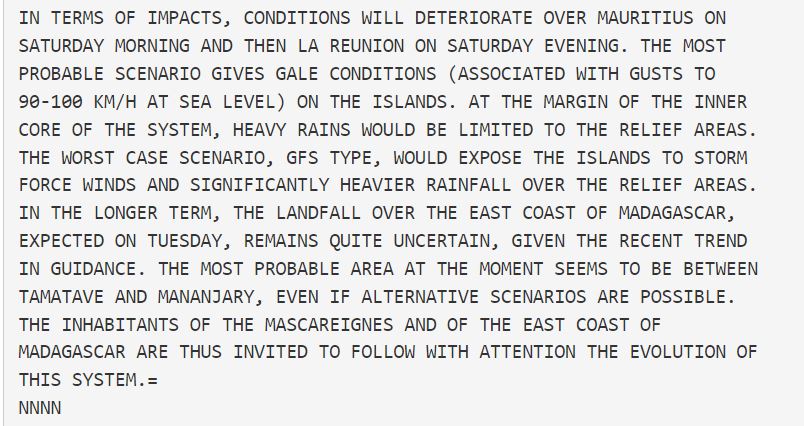
The full UN meeting can be watched here >> media.un.org/en/asset/k12/k…
Beginning with an excellent briefing from @UN USG (Under Sec Gen) for Political and Peacebuilding Affairs.
The subject of the meeting is Minsk Agreements, which have failed to bring peace over the past 7 yrs.
Beginning with an excellent briefing from @UN USG (Under Sec Gen) for Political and Peacebuilding Affairs.
The subject of the meeting is Minsk Agreements, which have failed to bring peace over the past 7 yrs.
https://twitter.com/althecat/status/1494358594506088449

The second briefing is from two representatives of the OSCE - the Organisation for Security and Cooperation in Europe - which is responsible for monitoring the Minsk Agreements.
Both briefers lament the absence of implementation of the Minsk Agreements.
Both briefers lament the absence of implementation of the Minsk Agreements.

Both briefers discuss the reasons for the failure to of the Minsk Agreements to be fully implemented. But they both also point towards there being less conflict over the past year.
And both thank the efforts by Germany and France to restart the Normandy 4 format talks.
And both thank the efforts by Germany and France to restart the Normandy 4 format talks.
The briefings are comprehensive, factual and horrific. 14,000 casualties have been recorded over the 8 years since the Minsk Agreements - which are backed by a UNSC resolution.
The briefers discussed the impact of the pandemic on both civilians mediation and monitoring efforts.
The briefers discussed the impact of the pandemic on both civilians mediation and monitoring efforts.

They sound rather grumpy and frustrated about it all.
Especially about recent deteriorations in the situation wrt to freedom of movement of the monitors, and interference with monitoring equipment on both sides of the contact line.
Especially about recent deteriorations in the situation wrt to freedom of movement of the monitors, and interference with monitoring equipment on both sides of the contact line.
Basically its a mess.
This is a map of the contact line between the breakaway "Donbass" areas in South Eastern Ukraine.
This is a map of the contact line between the breakaway "Donbass" areas in South Eastern Ukraine.

The briefers reported that there has been a significant increase in explosions along the border in recent days - but that these appear to have reduced in recent hours.
The diagrams below relate to the humanitarian problem of civilian cross border transit.

The diagrams below relate to the humanitarian problem of civilian cross border transit.


Next briefing is from Ukrainian Tetyana Montyan (apparently) speaking on behalf of the people of the Donbass, i.e. the people on the Russian side of the contact line.
She strongly blames the Kyiv Govt. and its Western supporters in the US for the failure of Minsk process.
She strongly blames the Kyiv Govt. and its Western supporters in the US for the failure of Minsk process.

She concludes saying that Europe should "compel its marionettes" in Kyiv to implement the agreements.
The UNSC PR also servings as UNSC President follows. Who is also complaining about the lack of implementation of the Minsk Agreements and seems to agree with the previous speaker about the reasons. 

He goes on to explain in detail Russia's problem with the Minsk Process, and its non-implementation, pointing out that there Russia is accused on not doing what it is supposed to do, but saying that it is not mentioned in the agreement and not responsible for implementation.
He blames the Ukrainian Govt for continuing the conflict and not allowing the first step in the Minsk process - a ceasefire. And it appears that Russia is not keen on the Normandy Talks reopening the Minsk agreement - to which it is not a party.
The Russian President of the UNSC then hands over to @SecBlinken and suggests he not talk about imminent Russian Invasions and turning the meeting into a "circus".
Blinken proceeds to insist that the surrounding of Ukraine with armed forces is what the UNSC should discuss.
Blinken proceeds to insist that the surrounding of Ukraine with armed forces is what the UNSC should discuss.

He proceeds to disclose even more intelligence claiming that there are detailed Russian plans for an invasion - providing quite a lot of lurid detail about the possible pretexts and the carnage that he claims the Russia is planning for Ukraine.
This is a stunningly self-serving and weak statement - not that it will be reported as such in Western Media - and as noted in my earlier thread - in my assessment the US is being played here - very effectively.
On concrete matters @SecBlinken says the US will support Normandy Format meeting efforts to resolve the crisis - and encourage the Ukraine Govt to do so. The US is happy to shoulder any criticism should Russia change its mind and not invade Ukraine. Which is a little gracious.
And then we have James Cleverly from the UK. Who like the US has elevated the status of the meeting by sending a member of Cabinet rather than its Permanent Representative Ambassador. 
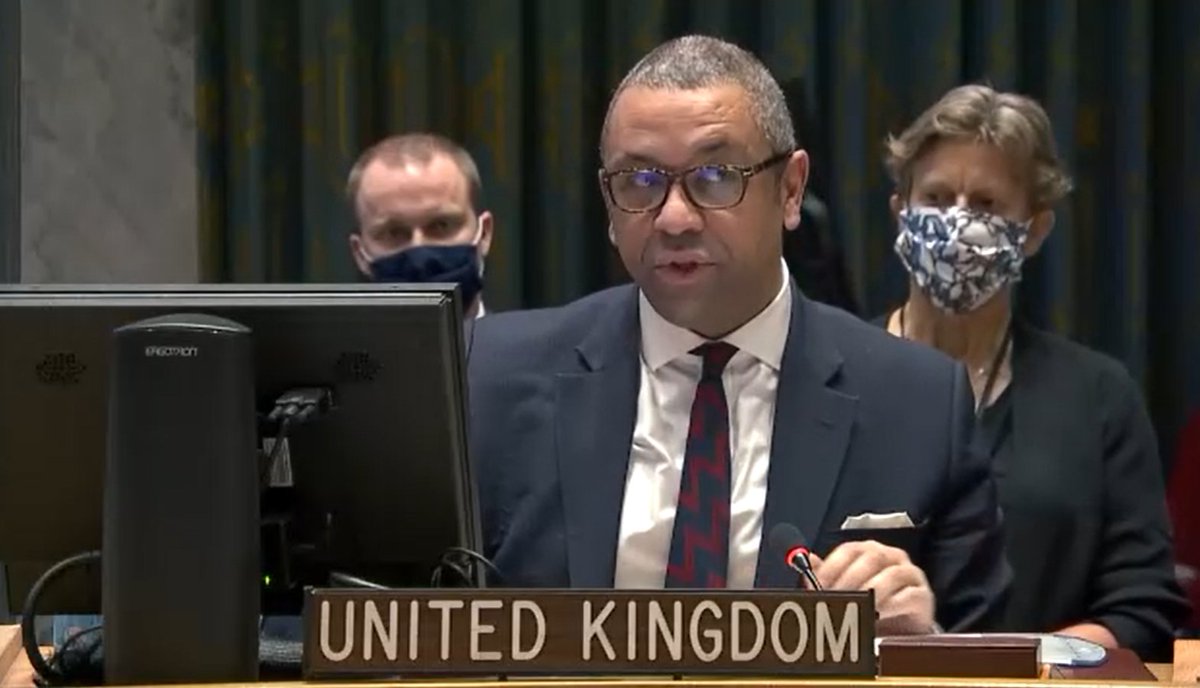
Mr Cleverly says this is all Russia's fault. Calling a possible invasion a "conflict of choice". Like @SecBlinken, the UK representative in this meeting appears to be more concerned with maintaining a consistent spin on all this than contributing constructively to a resolution.
@SecBlinken The Norwegian UNSC representatives remarks are much more in tune with the diplomatic environment and contains some concrete suggestions. Speaking against Russian arming the Donbass troops and calling for Russia not to recognise Donbass as proposed by some in the Duma. 

Brazil's UNSC PR, whose President recently visited Putin in Russia says only sensible diplomatic things. He points to the need for the process to begin as soon as possible with a ceasefire - the first step in the Minsk Process. 

Ireland's PR was also sensible and straightforward in her comments, thanking the briefers, and the work of the monitoring and mediations groups TCG and OSCE. 

Kenya's erudite PR raised the bar addressing the elephant in the room and how the issues in Ukraine threaten the global order. He also backed Minsk Process efforts and commended US and Russian diplomats for indicating a willingness to meet soon to resolve things. 

New UNSC member UAE also backed Minsk efforts and raised concerns about the humanitarian situation in conflict areas. And like previous speakers mentioned the need to preserve international law and in particular territorial integrity and good neighbourliness. 

The second African UNSC member Ghana spoke next also highlighting humanitarian concerns for civilians, and the importance of peaceful diplomatic resolution disputes and the prohibition of using threats of military force. 
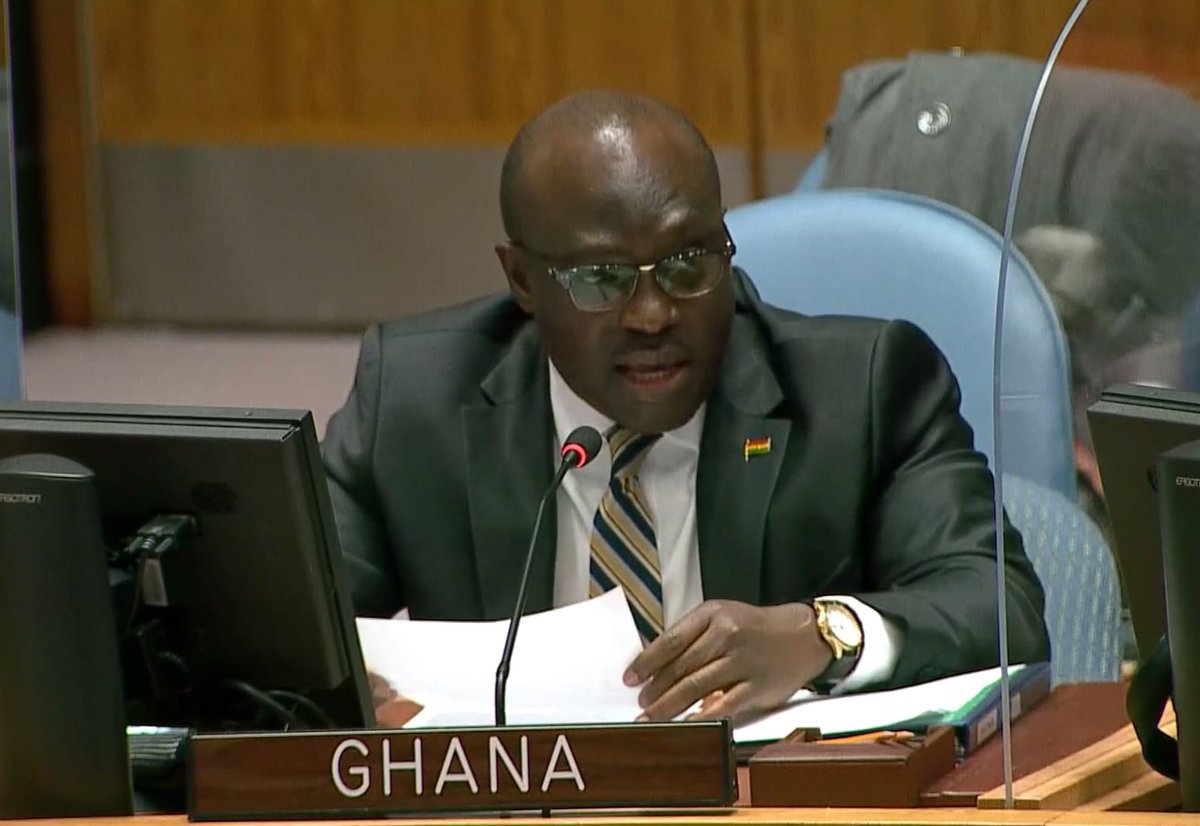
He also urged the parties to the conflict to engage with the Minsk Process in good faith to resolve the crisis.
Mexico was also sensible, and like Kenya raised global concerns about the apparent escalation and rhetoric, and proposed a formula of "Détente, Diplomacy and Dialogue" to resolve the crisis as quickly as possible via the Minsk Agreements. 
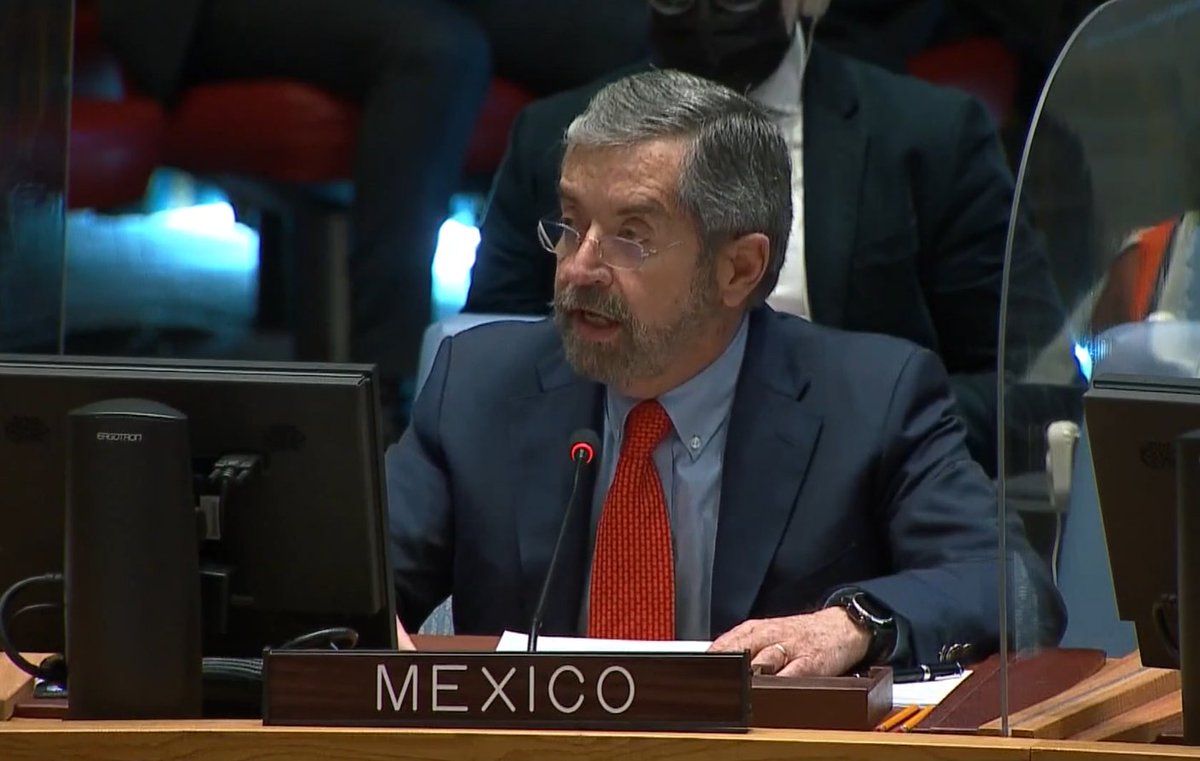
"China believes that the effort to resolve the issue must necessarily go back to the starting point", and called for a roadmap and timetable to be drawn up for the political implementation of the Minsk Agreements which were "binding" on the parties to resolve the Ukraine Crisis. 

China then cast some heavy shade on the U.S.
"Everything happens for a reason, NATO's continued expansion in the wake of the cold war runs counter to the spirit of the end of the cold war. This applies as much to Europe as anywhere else."
He urged the US to learn from history.
"Everything happens for a reason, NATO's continued expansion in the wake of the cold war runs counter to the spirit of the end of the cold war. This applies as much to Europe as anywhere else."
He urged the US to learn from history.
His remarks about the US - made without naming the US - in relation to the Asian Pacific region are possibly the most important remarks made in the meeting. But will doubtless not be received well in Washington.
Albania is another new member of the UNSC and also made novel remarks, speaking against the Duma's calls for recognition of Donbass, and urged Russia not to risk creating a failed state in Ukraine.
Albania is geographically the closest nation (apart from Russia) to Ukraine.
Albania is geographically the closest nation (apart from Russia) to Ukraine.

Albania's PR spoke passionately of the need for de-escalation and urged Russia to take up the offer from Poland to attend OSCE meetings. And also encouraged Russia to accept the offer from @SecBlinken to speak directly.
France spoke next.
France was instrumental in reopening the Minsk Process via the Normandy Format as a route to resolve this crisis.
France considers the military buildup on the border to be threatening. And Ukraine has been attacked by Russia before.
France was instrumental in reopening the Minsk Process via the Normandy Format as a route to resolve this crisis.
France considers the military buildup on the border to be threatening. And Ukraine has been attacked by Russia before.

France is convinced that de-escalation is possible through dialogue and diplomacy. We are prepared to undertake this dialogue not only wrt to Donbass but also on Security in Europe.
We fully support the OSCE process proposed by Poland for a dialogue on security in Europe.
France is firmly convinced that the Minsk Agreements are the path to settlement of this crisis. Also very concerned about the Duma recognition of Donbass proposal.
France is firmly convinced that the Minsk Agreements are the path to settlement of this crisis. Also very concerned about the Duma recognition of Donbass proposal.
"If it were to pass it would call into question the territorial integrity of Ukraine."
France is also convinced that the Minsk Agreements "leave open a necessary space for defining mutually acceptable concrete solutions within the TCG"
I.E. some agreed changes.
France is also convinced that the Minsk Agreements "leave open a necessary space for defining mutually acceptable concrete solutions within the TCG"
I.E. some agreed changes.
Note that changing, reopening, the Minsk Agreements is something that Russia seems to be opposed to.
Next up Gabon - the third African representative to speak. He starts by saying that Gabon understands the situation that Ukraine is in with having the threat of military action on its borders. 

Gabon also calls upon the parties to engage in diplomacy via the Minsk Process and the N4 format. He makes a sanguine observation - that economic benefits to the parties could flow from a peace settlement.
That concludes the round robin of UNSC member nations
Russia's representative - Deputy MFA Russia Minister Sergei Ryabkov [en.wikipedia.org/wiki/Sergei_Ry…] takes the floor next and responds to some of the remarks made earlier.
Russia's representative - Deputy MFA Russia Minister Sergei Ryabkov [en.wikipedia.org/wiki/Sergei_Ry…] takes the floor next and responds to some of the remarks made earlier.

"I would like to dwell on some issues which were touched upon".
R.E. Duma proposal for recognition - "This is a proposal to reflect on, mentions shelling and Russian citizens in the area then adds "we should avoid commenting on decisions made by Parliaments."
R.E. Duma proposal for recognition - "This is a proposal to reflect on, mentions shelling and Russian citizens in the area then adds "we should avoid commenting on decisions made by Parliaments."
He also describes the discussion of this matter as "unnecessary speculation" clearly its a slightly touchy subject. His answer suggests it may not be approved by President Putin.
"What we need to do today is concentrate on the implementation of the Minsk Agreements... and many people have said so today."
Replying to the UK's Cleverly, Ryabkov described the UK Minister's history of the Crimea crisis as "one sided" missing out a bloody coup in Kyiv glorifying Nazis.
[NOTE: This was claimed at the time.. a hotly disputed piece of recent history.]
[NOTE: This was claimed at the time.. a hotly disputed piece of recent history.]
"As regards to the alleged prepared aggression against Ukraine, some people usefully put forward the military scenarios (@SecBlinken) this is regretable and dangerous. We made a large number of statements...
... and it is very unfortunate that those statements, made at the highest level in Moscow, were not heeded. The fact is the Russian forces were in Russian Territory and remained in Russian Territory. We are saying we are conducting drills....
... Ukraine is violating the Vienna agreement. The US has provided 650 million of lethal weaponry to Kyiv, and another 200 million. Poland is providing ammunition for weapons which are banned under the Minsk agreement...
... we are ready for a real dialogue, not an immitation a very real one. Today the US Ambassador received our response on the Nato issues."
The US then unsurprisingly requested a right of reply. Which was delivered by @USAmbUN @LindaT_G. Who said she had been expecting to hear a response to our request for a "without equivocation assurance that they do not plan to invade Ukraine". 

But instead we heard more disinformation. She went on to say that @SecBlinken had said that "we came here today to prevent war" and that the US would continue to escalate its diplomacy. She added that the US would look closely at the Russian response received today.
And then Ukraine finally got to speak.
[Meta: It might make sense for the UNSC to allow the nation which is being discussed to speak at the beginning and end of UNSC consultations/briefings to make the process more useful.]
[Meta: It might make sense for the UNSC to allow the nation which is being discussed to speak at the beginning and end of UNSC consultations/briefings to make the process more useful.]

After an introduction talking about atrocities and breaches of the Minsk agreements by Russia/Donbass he turned to Duma issue which he says he was instructed by his govt to raise - pointing out that Russia is a signatory to the Minsk Agreement.
He then thanked the US, France, UK, Norway, Albania and other for their statements. He then criticised the UN for its soft and feeble response to the occupation of parts of Georgia by Russia in 2008. He introduced a letter to the record and asked for a UNSG response on this.
He then moved on to the detail of the Minsk Agreements mentioning that Russia and Ukraine had agreed to OSCE monitoring of borders (I think this is a reference to not allowing OSCE monitoring the Russian border with Ukraine's Donbass region).
"Ukraine expects Russia to comply with this agreement which would then become a major element in the resolution efforts."
This is important now due to the military build up on this border. He points out that the military build-up has had a major economic impact on Ukraine already - and that the naval blockade has exacerbated this - blocking major Ukraine ports.
"Ukraine remains committed to a peaceful resolution of its dispute with Russia by political and diplomatic means. Not only for itself but for the entire Europe."
"We welcome all diplomatic and other efforts to prevent the worst case scenario."
"We welcome all diplomatic and other efforts to prevent the worst case scenario."
"Reinvigorating the Normandy Format and TCG is one of the necessary steps, both include Russia and Ukraine and constitute the right frame work to resolve the conflict by direct dialogue."
But there is a kicker:
"As long as Russia makes preconditions about direct dialogue between Ukraine and Moscow's proxies which are effectively a non-starter, the progress on the implementation of the Minsk Agreements will remain elusive."
"As long as Russia makes preconditions about direct dialogue between Ukraine and Moscow's proxies which are effectively a non-starter, the progress on the implementation of the Minsk Agreements will remain elusive."
He says the meetings in Paris and Berlin where helpful and says Ukraine is ready to resume Normandy 4 meetings in all forms, but regrets that Russia remains unwilling to participate in an N4 Summit.
Further: "The last time our leaders met in Paris in December 2019 the decisions remain un-implemented despite Ukraine regularly putting forward concrete initiatives on the [Minsk Agreements]."
Lots more detail follows r.e. Russia not doing things agreed June 2020. He then raises a known sticking point to political progress with respect to local elections and a political settlement - i.e. control of the border with Russia, which is necessary for election security.
He holds up three signed agreements signed by Russia's Ambassadors about this in 2014-2015 which were not implemented. 

And finally he raises (in Russian) claims by a Russian which are clearly a sore point, they seem to relate to claims that the the USSR was not dissolved in 1994 + something to do with a poet's comments on Stalin from the 1960s.
In Summary: Ukraine says it is willing to take the Minsk Process dialogue forward and counters Russia's allegations that it is blocking progress with similar counter allegations, with the main sticking point being control of the Russian border with Donbass - a known issue.
Russia for its part accuses Ukraine of not being willing to progress the Minsk agreements - preferring its interpretation of the agreements as being some kind of stepwise process - starting with a ceasefire. Something still not effectively achieved.
But all of this on its face looks like the sort of stuff which should be able to be resolved via talks - and Ukraine and Russia clearly now have everyone's attention - as well as the active engagement/support of Germany and France in this endeavour.
And next we have Germany, the other non UNSC nation invited to participate in this meeting, represented by its UN Permanent Representative Ambassador Antje Leendertse. 

She says Germany remains committed to participating in the Normandy Format to resolve the process, is concerned about the Duma decision, supports the OSCE efforts to provide facts and is disturbed by the destruction of monitoring equipment.
She says Germany deplores the absence of a "satisfactory explanation" for the build up of military forces on the borders, and points out that the UN Charter not only prohibits the use of force, but also the threat of the use of force.
She concludes by advertising the fact that the UNGA is having a debate on the crisis on 23rd Feb and reaffirming that Germany remains committed to achieving a diplomatic solution to this crisis.
And then Russia takes back the mic. in its capacity as Russia to intervene for a third time. Which seems unusual - but perhaps also productive in this instance. 
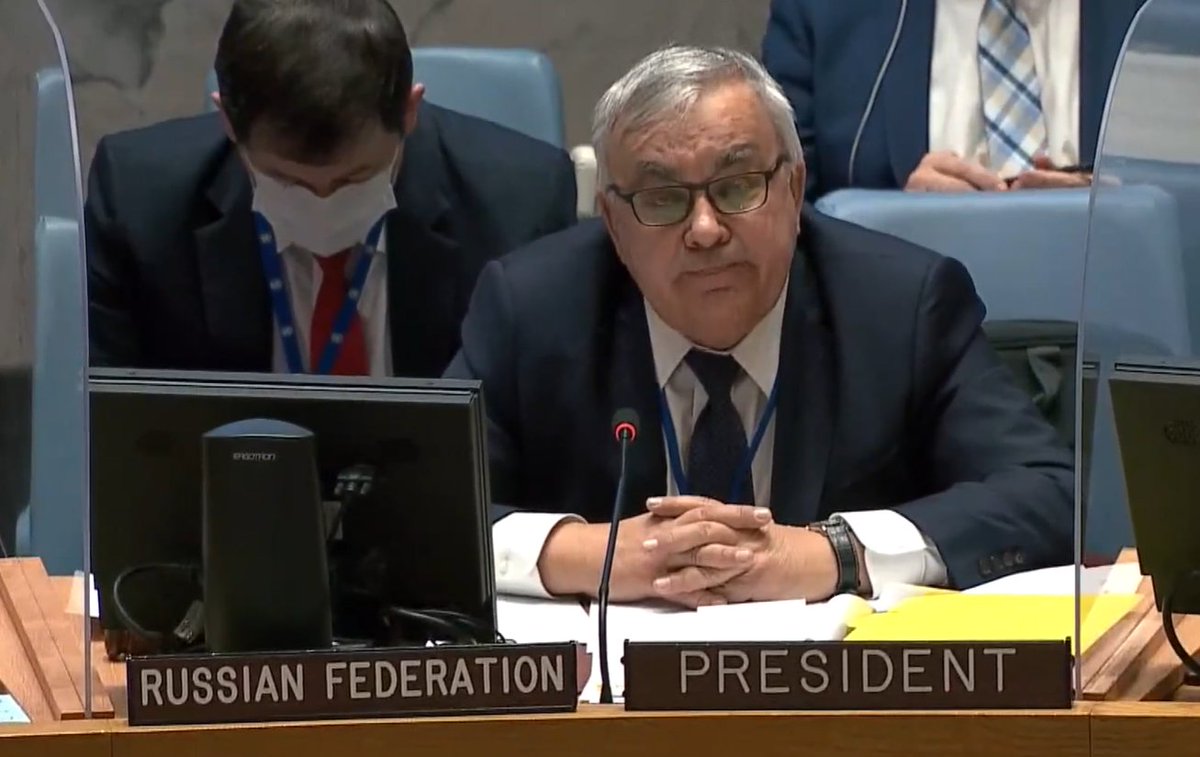
He starts by saying he is grateful to the German representative for her statement. And then moves on to the "war" threats. Saying that Russia has never mentioned war.
We have a meeting today on Minsk and I am very satisfied with the fact that many have agreed that Minsk is the correct framework to resolve this.
He then claims that Zelensky has said that Minsk Agreements are "totally without merit" and then notes the issue of claims from Ukraine that Russia doesn't legitimately hold its UNSC seat.
He also makes a passing remark about the poet reference from Ukraine's representative.
On balance Sergei Ryabkov appears to be rather pleased with how this meeting has gone.
On balance Sergei Ryabkov appears to be rather pleased with how this meeting has gone.
Russia's objective in all of this - bearing in mind that this meeting is their idea - was to bring Ukraine back to the table to implement the Minsk agreements, and on the face of it that appears to have been agreed.
Germany welcomed Russia's announcement of its decision to withdraw troops (disputed by the US yesterday on a factual basis) and asked for it to be implemented as soon as possible.
Presumably this will need to be implemented by way of a decision/instruction from Vladimir Putin - which hopefully will come soon.
And then perhaps the doomsday clock can be reset back to a few minutes before midnight.
/Ends
@threadreaderapp unroll
And then perhaps the doomsday clock can be reset back to a few minutes before midnight.
/Ends
@threadreaderapp unroll
• • •
Missing some Tweet in this thread? You can try to
force a refresh




